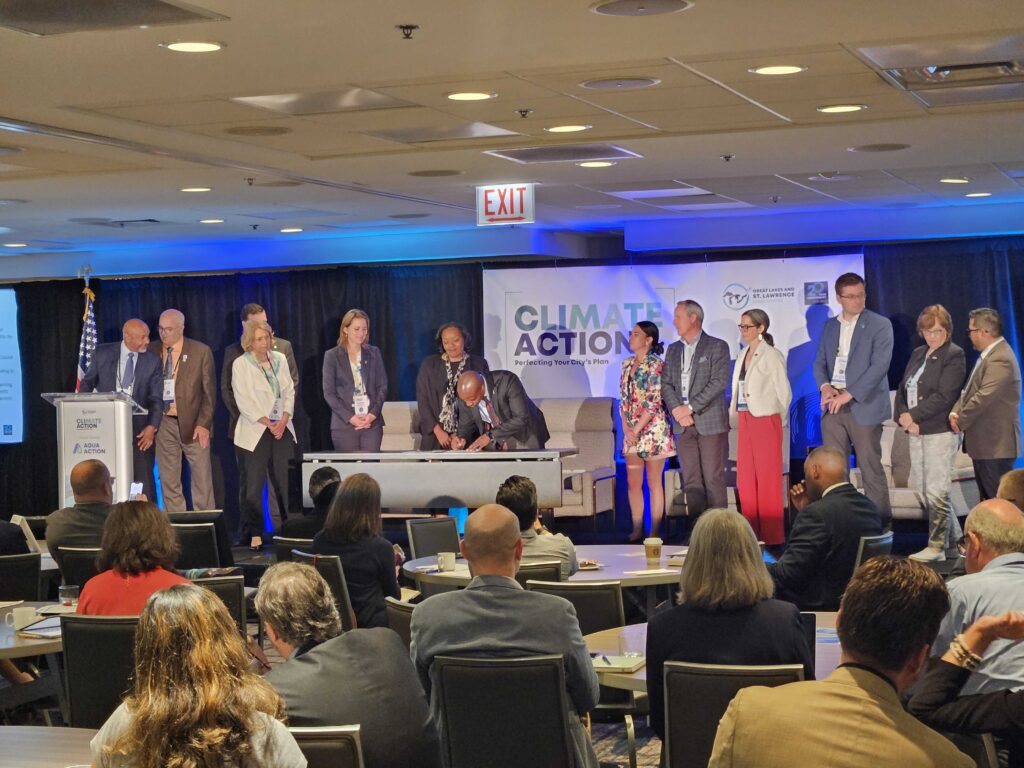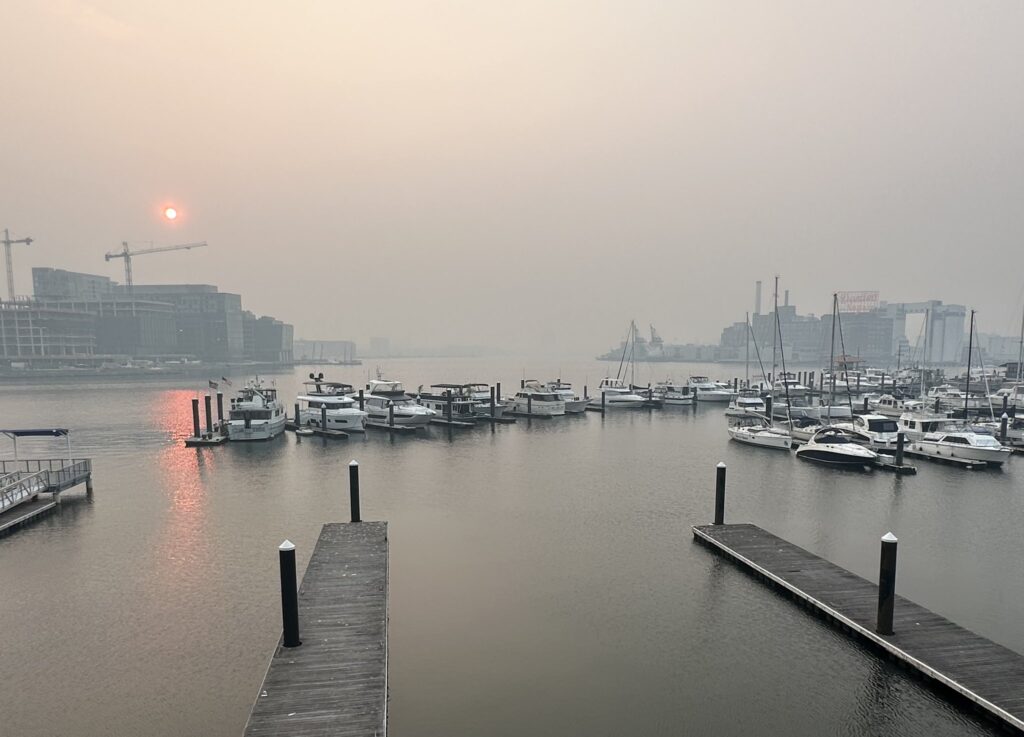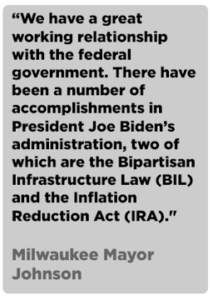Milwaukee Mayor Johnson’s climate action strategy to reduce poverty and crime
By: Steve Schuster, [email protected]//June 8, 2023//
Milwaukee Mayor Johnson’s climate action strategy to reduce poverty and crime
By: Steve Schuster, [email protected]//June 8, 2023//

By Steve Schuster and Ethan Duran
[email protected]
[email protected]
Milwaukee Mayor Cavalier Johnson Wednesday joined mayors from the United States and Canada’s Great Lakes regions in signing a pledge to address climate change and expand environmental equity, which the mayor says could have a positive impact on reducing poverty and ultimately crime in Wisconsin’s largest city.

As mayors exchanged best practices to perfect their respective climate action plans, Johnson shared his vision for Milwaukee during The Great Lakes and St. Lawrence Cities Initiative annual conference held on Chicago’s Magnificent Mile.
Also in attendance were federal government officials from the Environmental Protection Aagency and Illinois Governor J.B. Pritzker.
Waxing poetic, Milwaukee’s Mayor Johnson said, he is excited about Milwaukee’s bright future.
“I am enthused about the future of Milwaukee as it relates to our climate resiliency,” Johnson said during an exclusive interview with the Wisconsin Law Journal after Wednesday’s panel discussion in Chicago.
Johnson said there is a direct link between poverty, crime, and climate change.
“There is a nexus between them all,” Johnson said.
“Poverty leads to violence and violence is crime. Where climate change comes into that nexus is the fact that in Milwaukee years ago, we had the highest quality of life for African Americans in the United States. That’s because folks had access to good paying family supporting careers in heavy manufacturing. Those jobs dried up and went to right-to-work states in the South, and they went overseas for cheap labor leaving those same neighborhoods — neighborhoods that I grew up in … quite frankly, sort of in the lurch, holding the bag where the people who lived there didn’t have access to those family and support opportunities,” Johnson said.
The problem is cyclical, he said.
“That’s how people in those neighborhoods get into the cycle of poverty which then leads to violence,” Johnson added.
One possible solution: Green jobs.
“What we are able to do with our focus on climate resiliency is work to increase the opportunity for folks to have jobs in the green sector and in the green economy,” Johnson said.
Johnson said his administration is working to make sure green jobs are accessible.
“We are working to make sure folks who live in those neighborhoods have access to those jobs and when they have access to good paying jobs, just like they once had once did decades ago,” Johnson noted.
Stability will benefit all, he said.
“They will have more stability in their lives. If they have good stability in their lives with a good paying family supporting job, they will be able to purchase their homes. If they purchase their homes they become stabilizing forces in their neighborhoods. If you get a critical mass of that happening and folks aren’t so transient, they become familial. You build up those relationships with your neighbors … the neighborhoods start to become cohesively, they start to jell and when those neighborhoods jell and become cohesive that’s how you get to the truth public safety that all of us are talking about,” Johnson said.

“There certainly is a nexus between poverty, crime, and climate change,” Johnson added.
“There are a lot of things we have done and will continue to do with our infrastructure that makes us more climate resilient in the future,” Johnson said, noting that enhancements to Milwaukee’s biking infrastructure would reap several benefits.
“During my administration, I want to build out a protected bike lane system throughout Milwaukee … I think that’s important for reducing greenhouse gases,” Johnson added, noting that biking is also good for resident’s physical and mental health.
Citing partnerships with Milwaukee Public Works, Milwaukee Public Schools and Milwaukee Metropolitan Sewerage District MMSD, Johnson said there are a lot of opportunities to reduce greenhouse gas emissions in Wisconsin’s largest city.
Highlighting a project with the school system and MMSD Johnson noted how officials have successfully transitioned asphalt school yards into “outdoor learning spaces.”
Milwaukee’s mayor said his overall plan is to reduce “greenhouse emissions that come from buildings” noting the benefit to those who live in disadvantaged communities.
“In a number of ways, we’re working to address the issue, but (we are) also looking out for folks who have been trapped in neighborhoods where they’ve had challenges for years,” Johnson said at the conference.
The initiative, chaired by Zion, Ill. Mayor Billy McKinney, is a coalition of around 15 mayors and seven delegates whose cities and towns rely on Great Lakes water, according to the organization’s website.
Wednesday’s conversation occurred in the midst of raging Canadian wildfires which have left U.S. cities including Baltimore and New York covered in a thick orange haze. Officials gave warning to residents in the eastern U.S. to stay inside or limit outdoor activity as air quality alerts hit “Code Red” for the third straight day in some places, The Associated Press reported.

Cities consume more than two-thirds of the world’s energy and account for more than 70% of global carbon dioxide emissions, according to the United Nations Framework Convention on climate change.
The increase in global surface temperatures attributed to human-caused greenhouse gas emissions has resulted in ice melting and sea levels have been rising. Several cities in the United States including in Florida, Texas, Virginia, New Jersey, Georgia, and South Carolina are predicted to be under water by 2050, USA Today reported.
During Wednesday’s interview, Johnson said his climate action strategy will not only address carbon footprint reduction, but it will also protect the most vulnerable.
“There are significant challenges facing members of communities across the United States and Canada as it relates to the recent wildfires that are (currently) happening,” Johnson said.
Focusing on climate action and climate equity are priorities of Johnson’s administration.
“Making sure people have access to clean water and clean air and the like. We want to go on record saying we support initiatives and efforts to lift up people who live in communities across the U.S. and Canada that are negatively impacted by the effects of climate change,” Johnson said.
During a conference panel discussion, Johnson said federal partnerships are key to the success of his climate action plan.

“We have a great working relationship with the federal government. There have been a number of accomplishments in President Joe Biden’s administration, two of which are the Bipartisan Infrastructure Law (BIL) and the Inflation Reduction Act (IRA). It sends billions of dollars to communities across the U.S. to tap into and make these investments to make sure we’re climate resilient and lifting people out of poverty. Our partnerships with the Biden Administration are going to be key to fund these initiatives. That’s what we’ll be focusing on. Our Environmental Collaboration Office has already zeroed in on tens of millions of dollars of funding from those federal sources,” Johnson said.
The money from Bipartisan Infrastructure Law and Inflation Reduction Act will put local governments in a better position to make their own respective investments for low-income communities to work to build the infrastructure Milwaukee needs to tackle current and future climate challenges, Johnson said during his interview with The Daily Reporter.
In November of 2021 when the Bipartisan Infrastructure Law was first signed, the labor organization Wisconsin Laborers’ District Council celebrated the bill for its investments in infrastructure such as roads and bridges, clean drinking water and energy systems. The legislation would help support workers and create jobs, according to the organization.
After Johnson and St. Catharines, Ontario Mayor Mat Siscoe exchanged climate action strategic initiatives Wednesday, EPA officials along with the newly elected Chicago Mayor Brandon Johnson, and Illinois Gov. J.B. Pritzker also shared their climate action plans.
Sheboygan Mayor Ryan Sorensen was also slated to appear on Thursday, June 8.
While talking about transforming Chicago’s economy into a more sustainable one, Mayor Brandon Johnson (no relation to Milwaukee Mayor Johnson) said he had three policy proposals in mind: Creating priority lanes for city buses, an ordinance to retrofit old buildings and remediate lead pipes and an ordinance to hold the city accountable to its goals to redevelop transportation.
Chicago Mayor Brandon Johnson said partnering with federal government in response to the current environmental crises is critical, and the city will have to work with municipal leaders in the region, including his “play cousin up the street,” Milwaukee Mayor Cavalier Johnson.
Gov. Pritzker said Illinois is committed to taking preventative action against the looming threat of climate change.
“We recognize the looming threat of the climate crisis, and we aren’t going to wait around to see what happens and hope for the best. We’re taking tangible, preventative action to create a more sustainable, environmentally conscious future for the next generation of Illinoisans and beyond,” Pritzker added.
On Earth Day 2023, Wisconsin Gov. Tony Evers established an Office of Environmental Justice through an executive order. The new office which falls under the Department of Administration works in collaboration with the Office of Sustainability and Clean Energy to facilitate collaboration across state agencies to provide strategies to promote environmentally just policies and prevent disparate outcomes in communities across the state while engaging with farmers and rural communities, communities of color, Tribal Nations, state and local partners, and low-income populations, among other key stakeholders.
Legal News
- Gov. Evers seeks applicants for Dane County Circuit Court
- Milwaukee man charged in dismemberment death pleads not guilty
- Democratic-led states lead ban on the book ban
- UW Madison Professor: America’s child care crisis is holding back moms without college degrees
- History made in Trump New York trial opening statements
- Prosecutor won’t bring charges against Wisconsin lawmaker over fundraising scheme
- Republican Wisconsin Senate candidate says he doesn’t oppose elderly people voting
- Vice President Harris to reveal final rules mandating minimum standards for nursing home staffing
- Election workers fear threats to their safety as November nears
- Former law enforcement praise state’s response brief in Steven Avery case
- Eric Toney announces re-election bid for Fond du Lac County District Attorney
- Former Wisconsin Democratic Rep. Peter Barca announces new bid for Congress
WLJ People
- Power 30 Personal Injury Attorneys – Russell Nicolet
- Power 30 Personal Injury Attorneys – Benjamin Nicolet
- Power 30 Personal Injury Attorneys – Dustin T. Woehl
- Power 30 Personal Injury Attorneys – Katherine Metzger
- Power 30 Personal Injury Attorneys – Joseph Ryan
- Power 30 Personal Injury Attorneys – James M. Ryan
- Power 30 Personal Injury Attorneys – Dana Wachs
- Power 30 Personal Injury Attorneys – Mark L. Thomsen
- Power 30 Personal Injury Attorneys – Matthew Lein
- Power 30 Personal Injury Attorneys – Jeffrey A. Pitman
- Power 30 Personal Injury Attorneys – William Pemberton
- Power 30 Personal Injury Attorneys – Howard S. Sicula











